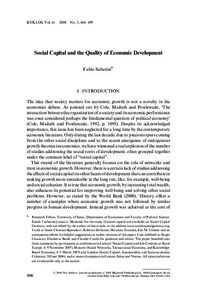Social capital and the quality of economic development

Kyklos. International Review for Social Sciences
2008
61
3
466-499
economic and social development ; well being ; social capital
Social sciences
English
Bibliogr.
"There is a surprising gap in the economic literature on social capital. First, we lack studies addressing the effects of social capital on those facets of development that can contribute in making growth more sustainable in the long run, like, for example, human development and social cohesion. Second, it is still unclear what type of networks may exert a positive effect on the different dimensions of development. In particular, the literature has not yet provided a rigorous assessment of the role of strong family ties, that are generally referred to as a form of bonding social capital causing backwardness. This paper investigates the relationship between the three types of social capital so far identified by the literature (i.e. bonding, bridging and linking), and the "quality" of economic development, as expressed by human development and an index of social well-being summarizing the state of health of urban ecosystems, public services, gender equality, and labour markets.
The empirical analysis is articulated in two stages carried out by means of a multivariate analysis and of a structural equations models analysis.
The results suggest that the linking social capital shaped by voluntary organizations has significantly positive effect on human development, but is irrelevant for social well-being. The bonding social capital shaped by strong family ties negatively affects human development, but significantly fosters the quality of life, mainly through a reduction of workers' precariousness. The bridging social capital of weak ties connecting friends and acquaintances follows the pattern of bonding social capital: it is reinforced by strong family ties and has significantly negative effect on human development."
Digital
The ETUI is co-funded by the European Union. Views and opinions expressed are however those of the author(s) only and do not necessarily reflect those of the European Union or the ETUI.